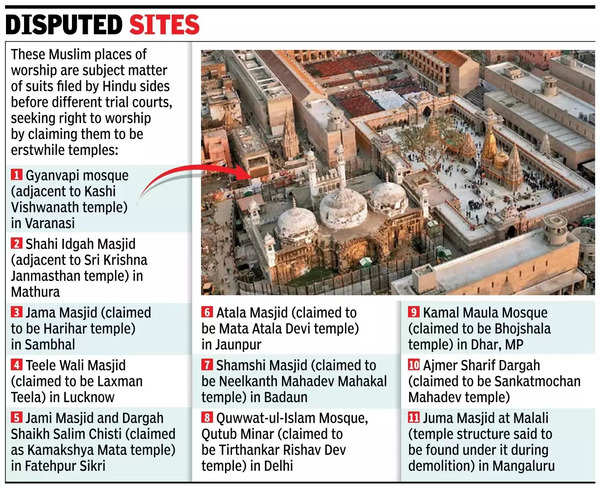NEW DELHI: While putting a freeze on the spate of lawsuits for reclamation of temples allegedly converted to mosques during the Mughal era while it hears the validity of the Places of Worship Act, 1991, Supreme Court said on Thursday, “The primary issue which arises for consideration is Sections 3 and 4 of the 1991 Act, their contours as well as their width and expanse. As the matter is sub judice before the court, we deem it appropriate to direct that though fresh suits (raising mosque-temple disputes) can be filed, no suit will be registered and proceedings undertaken (by trial courts) till further orders of the SC.” “Further, we also direct that in pending suits, trial courts will not pass any effective and final order, including orders for survey, till the next date of hearing,” the bench said in its omnibus status quo order.
The ruling, which was at odds with the refusal last year of a bench led by then CJI D Y Chandrachud to impose a prohibition on suits, drew vociferous opposition from senior advocates Rakesh Dwivedi, Maninder Singh, Vijay Hansaria and Vikas Singh, who said the court could not pass such a blanket order without hearing the Hindu parties. Advocate Sai Deepak said for implementation of the 1991 Act, surveys were mandatory to determine the religious character of disputed structures on Aug 15, 1947.

Solicitor general Tushar Mehta said: “When suits between two parties were pending in different trial courts, was it judicially permissible for a third unrelated party (Muslim organisations and petitioners) to come before the SC and seek a stay on those proceedings?” There are 18 suits pending before various trial courts raising reclamation of temple demand for 11 mosques. SC brushed aside the objections and asked when the core issue regarding Places of Worship Act was pending consideration before the highest court, would it not be proper for trial courts to hold their hands? “When the matter is pending in SC, will it be just and fair for any other court to deal with the subject matter and examine it? We are examining both the validity and ambit of the Act,” it said. Justice Viswanathan gave a glimpse of court’s mind on the conflicting stands of the two sides when he said, “There is a larger question. The suits which are pending must be stayed as Section 3 of the 1991 Act is to be adjudicated by the SC.”
“One view is that Section 3 is an effective manifestation or the reiteration of already embedded constitutional principles, so much so that even without the Act, if a suit were to be objected on the ground of plain constitutional principles, it is subject to interim orders from the court. Since the issue is pending in SC, civil courts cannot run a race with the SC. It is as simple as this.” SC had issued notice to the Centre on advocate-petitioner Ashwini Upadhyay’s 2020 petition on March 12, 2021 and on Jamiat Ulama-i-Hind‘s petition on Sept 9, 2022. On Thursday, it found the Union govt had not filed its response till date. The CJI Khanna-led bench told the SG that Centre must file a response to the cross-petitions in four weeks. It appointed three nodal counsel – Ejaz Maqbool, Kanu Agarwal and Vishnu Shankar Jain – to coordinate and compile responses of both sides and the Centre.
“The Centre’s reply must come on record. We require your response, and we cannot hear these petitions without the Union govt’s stand. The questions framed by the SC on Oct 12, 2022 will give you a fair idea to frame your response,” the bench said. The matter was posted for hearing on Feb 17, 2025.
PILs by the Hindu side have questioned the validity of the 1991 Act on grounds that Parliament did not have the competence to apply the law retrospectively and freeze status of religious structure as existing on Aug 15, 1947 when mosques were constructed over thousands of razed temples. The Muslim side argued history could not be changed through court orders and sought strict implementation of the Act, which had carved out an exception for the suits pending on the Ram Janmabhoomi-Babri Masjid dispute.
A five-judge bench on Nov 9, 2019 had awarded the disputed site for construction of Ram temple, but had ruled that the 1991 Act was an “affirmation of solemn duty which was cast upon the state to preserve and protect the equality of faiths as an essential constitutional value, a norm which has the status of being a basic feature of the Constitution. In preserving the character of places of public worship, Parliament has mandated in no uncertain terms that history and its wrongs shall not be used as instruments to oppress the present and the future”. However, SC, while dealing with the same bunch of pleas on July 11 last year, had refused to put a blanket ban on proceedings initiated in various courts for reclamation of temples.
